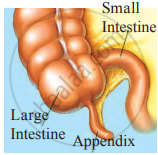Advertisements
Advertisements
Question
Complete the following diagram:

Solution

APPEARS IN
RELATED QUESTIONS
What are vestigial organs?
Give two examples of vestigial organs in human beings and plants.
Given below is the list of vegetables available in the market. Select from these the two vegetables having homologous structures:
Potato, sweet potato, ginger, radish, tomato, carrot, okra (Lady’s finger)
(A) Potato and sweet potato
(B) Radish and carrot
(C) Okra and sweet potato
(D) Potato and tomato
With the help of any two suitable examples explain the effect of anthropogenic actions on organic evolution.
Write the similarity between the wing of a butterfly and the wing of a bat. What do you infer from the above with reference to evolution?
Can the wing of a butterfly and the wing of a bat be considered homologous organs? Why or why not?
Name any two temporary embryonic structures in vertebrates which provide evidence for evolution.
How do homologous organs help in providing evidence for organic evolution?
Human tailbone is a vestigial organ. Explain.
Differentiate between analogous and homologous structures.
Select and write analogous structures from the list given below :
1) Wings of butterfly and birds
2) Vertebrate hearts
3) Tendrils of Bougainvillea and Cucurbita
4) Tubers of sweet potato and potato
The presence of which of the following types of organs in two organisms indicates that they are derived from the same ancestor?
(a) analogous organs
(b) respiratory organs
(c) digestive organs
(d) homologous organs
The wings of a housefly and the wings of a sparrow are an example of :
(a) analogous organs
(b) vestigial organs
(c) respiratory organs
(d) homologous organs
Explain with suitable examples importance of anatomical evidence in evolution.
With the help of diagrams, describe emasculation and bagging.
The most common types of fossils are ------------------------.
Draw a labelled diagram of T.S. of a leaf showing Kranz anatomy.
Differentiate between connecting links and the missing links.
Answer the following question:
What are homologous structures? Give an example. Is it necessary that homologous structures always have a common ancestor? Justify your answer.
Very short answer question.
What are homologous organs?
Very short answer question:
What is vestigeal organ?
_____________ is a vestigial organ in human beings.
Name the parts shown in the diagram.
Human jaw

Appendix : vestigial organ : : Peripatus : ____________
Define the evidence of evolution shown in the figure.

Select the CORRECT match.
Evolution has exhibited a greater stability of molecular structure when compared with morphological structures. Comment on the statement and justify your opinion.
Tendons and ligaments are examples of ______.
Basic principles of embryonic development were pronounced by:
Evolutionary convergence is the development of:
Which of the following is used as an atmospheric pollution indicator?
How do we compute the age of a rock?
The evolutionary story of moths in England during industrialisation reveals, that 'evolution is apparently reversible'. Clarify this statement.
Explain divergent evolution in detail. What is the driving force behind it?
You have studied the story of Pepper moths in England. Had the industries been removed, what impact could it have on the moth population? Discuss.
Industrial melanism in England after 1850 is an excellent example of Natural selection. Explain how?
Give examples of homologous organs and analogous organs in plants.
